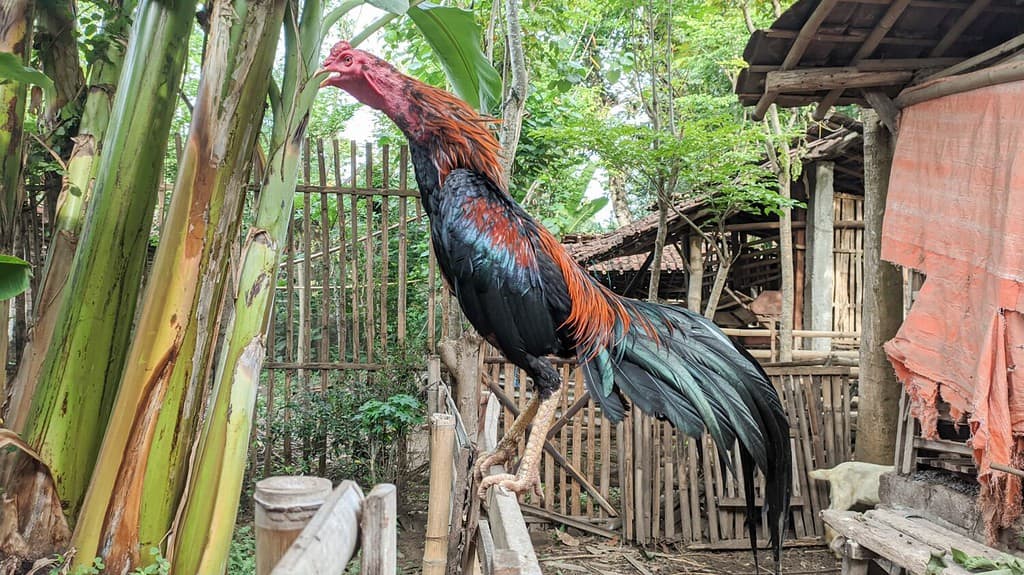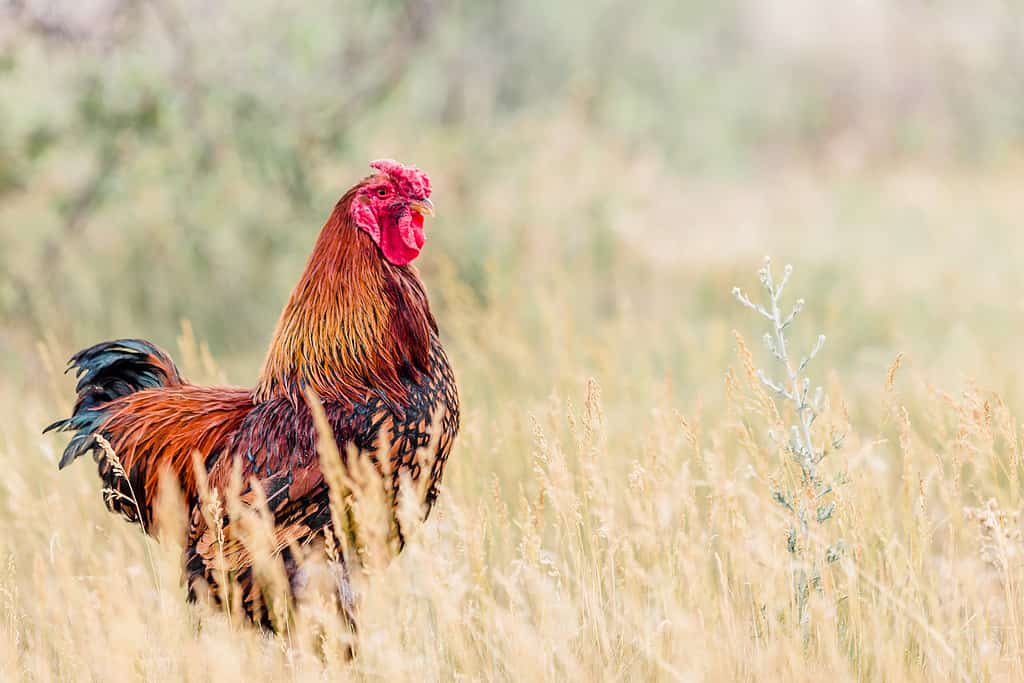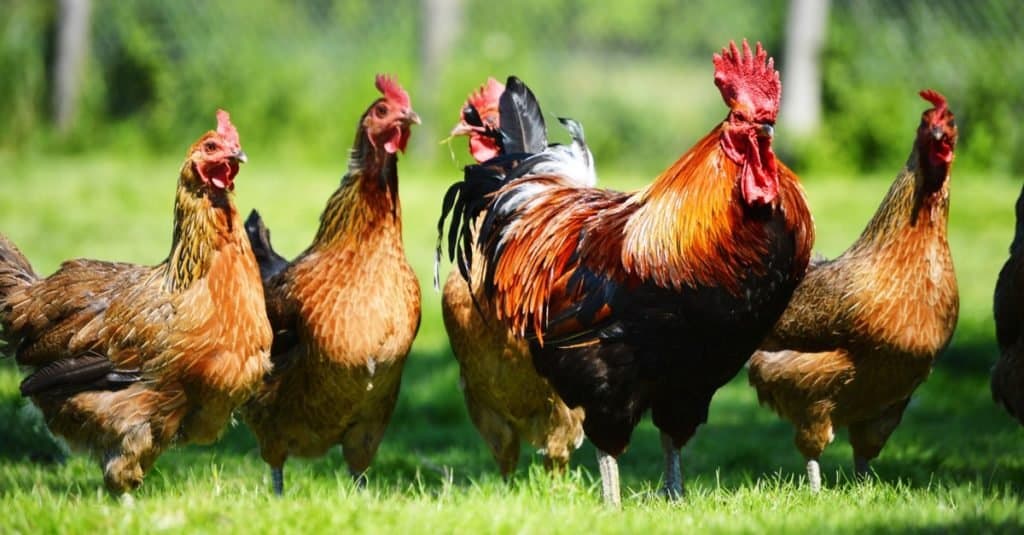What happens when you bring home a rooster when you meant to keep hens only? Occasionally, this can happen, especially if you’re raising chicks and pullets for your home flock. But what do you do with them if you don’t want them? Roosters do offer some advantages, so you might opt to keep one, but there are some disadvantages, too. In many cases, it’s a personal choice versus anything else. Let’s see what your options are if you wind up with a rooster.
Why Would You Wind Up with a Rooster?

Malay chickens are among the tallest chickens in the world, and they come in a variety of colors. But how do you wind up with one?
©Ajiputra081/Shutterstock.com
There are two basic reasons you’d wind up with a rooster. First, if you ordered pullets from a hatchery or breeder, once in a while roosters wind up in the mix. Secondly, if you bought chicks from the local feed store or pet store, you’ll likely wind up with a rooster or two. After all, they can’t be sexed until about 6 to 8 weeks of age.
Advantages To Owning a Rooster
Roosters sometimes get a bad rap. But there are definitely some advantages to keeping them if you wind up with one or two in your hatched flock. So, keeping one is always an option for what to do with a rooster if you bring one home.
- They offer protection to the hens. Roosters protect their flock, even if it means getting in harm’s way themselves.
- Roosters help keep flocks in order. They typically help by directing the hens back to the coop at night for safety.
- Roosters fertilize eggs, meaning you won’t need to purchase chicks or pullets each year to keep the flock growing.
- They may provide extra income, if you choose. Sell the fertilized eggs or chicks for some side earnings.
- Roosters also help guide the hens to find food if they’re struggling to find it while roaming.
- Roosters can make good pets, when properly cared for.
Disadvantages to Owning a Rooster
Roosters can be wonderful in many way, but for some, the negatives outweigh the positives.
- Roosters can be noisy. They don’t just crow at dawn, either. They crow at dusk or midday, during the middle of the night, or, well, any time they feel like it.
- Roosters can be mean. They have aggressive hormones coursing through their veins at times.
- Danger lurks behind those claws! Roosters can be pretty dangerous, especially for other birds, pets, or kids.
- Sometimes, roosters damage or hurt hens in their flock.
Option 1: Keep the Rooster

What do you do with a rooster? Well, you could keep it. They make great pets, fertilize eggs for more chickens to come, and many of them are absolutely gorgeous!
©Cavan Images/ via Getty Images
The first choice you have when you wind up with a rooster is to keep it. Many folks prefer this option to the alternatives. The key will be your ability to deal with the rooster’s needs while also caring for your hens properly.
If you have a breed of chicken that tends to go broody, keeping the rooster will particularly be useful. This will help your chickens actually hatch their eggs instead of just brooding over them.
How Many Hens Do You Need for a Rooster?
If you do opt to keep your rooster, you’ll want a minimum of four hens per rooster. Ideally, though, aim for ten hens per one rooster.
Some roosters are rougher on hens than others, though, so you may want more hens to keep the rooster from overstepping his bounds with them.
Keep an eye out for hens losing feathers. If they do, you likely don’t have enough hens for your roo.
Are Hens Happier With a Rooster?
If you have the correct ratio of hens to roosters, your hens could well be happier with a rooster around. On the other hand, hens don’t actually need roosters to live a full, happy life. Generally, if you’ve got chickens that go broody, they’ll probably be happier with roosters. Otherwise, it’s your call.
Option 2: Re-home the Rooster

A lot of folks don’t mind roosters. So, if you’re not sure what to do with a rooster you didn’t plan on, you could re-home it pretty easily.
©cynoclub/Shutterstock.com
Like any other animal, re-homing is an option. There are many ways to find a new home for your rooster, from posting the bird on Craigslist to taking them to a shelter.
Post on Social Media or Freebie Sites
Animals often find new homes through social media sites. You can post on your own social media channels like Facebook or Instagram, seeing who might want to bring home your bird. Or look into sites like Freecycle, Craigslist, Petfinder, or the ASPCA site.
Ask Local Friends and Family if They the Bird
Alternatively, if you feel uncomfortable throwing a wide net, ask people you know personally. Don’t hesitate to ask folks all around your area, even if they don’t already keep chickens. You never know who might be up for a new pet.
Take the Rooster to the Animal Shelter
If you’ve got one nearby, an animal shelter might be the right choice for your rooster. Not all shelters are suited to caring for chickens, though, so be sure to check in advance before bringing him over.
Option 3: Find a Farm

If you don’t know what to do with a rooster, sometimes, your best option is finding a farm for your feathery pal.
©monticello/Shutterstock.com
You could always find a farm where the rooster could enjoy a long, healthy life. You can do a Google search for this: “Farms that take roosters”.
Option 4: Show the Rooster in 4-H
Some folks don’t want to give up their roosters, so they opt to show them in local 4-H clubs. The roo could win prizes and if properly trained, could even become a favorite pet-show bird crossover.
Option 5: Enjoy a Nice Chicken Dinner
Of course, there’s always the option of turning that rooster into your next chicken dinner. You’ll have to kill, butcher, pluck, and cook the rooster, of course, so a lot of folks opt to give them away instead.
The photo featured at the top of this post is © JZHunt/iStock via Getty Images
Thank you for reading! Have some feedback for us? Contact the AZ Animals editorial team.







